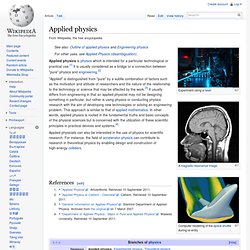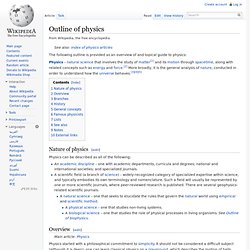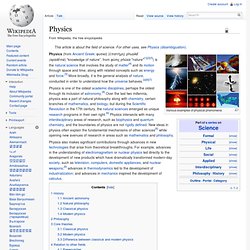

Applied physics. Applied physics is physics which is intended for a particular technological or practical use.[1] It is usually considered as a bridge or a connection between "pure" physics and engineering.[2] "Applied" is distinguished from "pure" by a subtle combination of factors such as the motivation and attitude of researchers and the nature of the relationship to the technology or science that may be affected by the work.[3] It usually differs from engineering in that an applied physicist may not be designing something in particular, but rather is using physics or conducting physics research with the aim of developing new technologies or solving an engineering problem.

This approach is similar to that of applied mathematics. Outline of physics. The following outline is provided as an overview of and topical guide to physics: Nature of physics[edit] Physics can be described as all of the following: An academic discipline – one with academic departments, curricula and degrees; national and international societies; and specialized journals.A scientific field (a branch of science) – widely-recognized category of specialized expertise within science, and typically embodies its own terminology and nomenclature.

Such a field will usually be represented by one or more scientific journals, where peer-reviewed research is published.
History. Branches. Essence. Physics. Various examples of physical phenomena Physics is one of the oldest academic disciplines, perhaps the oldest through its inclusion of astronomy.[8] Over the last two millennia, physics was a part of natural philosophy along with chemistry, certain branches of mathematics, and biology, but during the Scientific Revolution in the 17th century, the natural sciences emerged as unique research programs in their own right.

[b] Physics intersects with many interdisciplinary areas of research, such as biophysics and quantum chemistry, and the boundaries of physics are not rigidly defined. New ideas in physics often explain the fundamental mechanisms of other sciences[6] while opening new avenues of research in areas such as mathematics and philosophy. Physics also makes significant contributions through advances in new technologies that arise from theoretical breakthroughs. History.